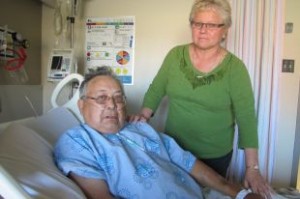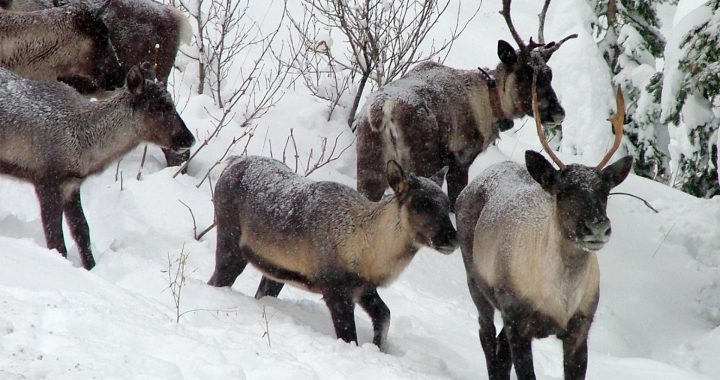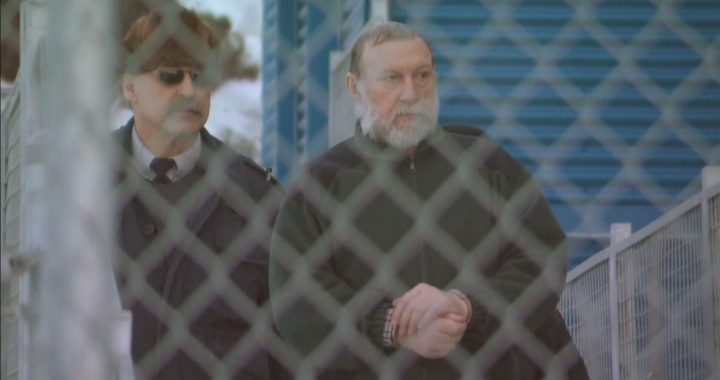(Antoine Delormier, 67, in his hospital bed in Cornwall Thursday. Photo courtesy of family.)
Jorge Barrera
APTN National News
A 67 year-old Akwesasne man who recently survived a heart-attack says he was brutalized by Canadian border agents Tuesday who forced him into secondary inspection because one of them caught a whiff of tobacco in his truck.
Antoine Delormier was on his way to the hospital when he was stopped at the border and manhandled by border guards after he refused to leave his truck.
Mohawk Council of Akwesasne Grand Chief Abram Benedict said in a statement the incident is being “reviewed and investigated” by Canada Border Services Agency (CBSA).
Delormier is currently in hospital recovering from pneumonia which was diagnosed shortly after he arrived in the hospital following the incident at the Cornwall Island border crossing. Delormier was taken by ambulance from the CBSA customs post where he was briefly held in a cell.
Delormier lives on Cornwall Island which is known as the Kawehno’ke district of the Mohawk community of Akwesasne.
While Akwesasne straddles the Canada-US border, the island sits in the St. Lawrence River within Canada and is connected by a low-level bridge to the city of Cornwall. The border post is situated in Cornwall and this forces island residents to cross through Canadian customs even if they never leave the country.
Delormier said he was feeling ill Tuesday morning. After suffering a heart attack and undergoing surgery to implant five stents into his arteries three weeks earlier, he didn’t want to take any chances and got into his truck for a trip to the hospital.
“I figured well, I’ll take it easy go in my truck and go to the hospital,” he said “Maybe they’ll give me some oxygen.”
When he pulled up to the border post booth he was met by a woman border agent who started to write on a yellow piece of paper, which usually means a trip to secondary inspection. Delormier had not travelled to the U.S. that morning and was simply going from one part of Ontario to another.
“She says take this over to the canopy where the inspection stations are and wait for these guys to come over,” said Delormier. “I was kind of upset about this. They like to harass people I think for no reason at all and I kind of figured that is what they were doing to me. I told her to take the paper there herself. I drove to the canopy and sat there for about 10 minutes.”
The agent had caught the smell of tobacco emanating from the truck, Delormier was later told.
Suddenly Delormier noticed his truck surrounded by about five CBSA agents who demanded he step out of the truck.
“I said no, so one of the guys reached in and grabbed the key of the ignition and the other guy grabbed my arm and twisted it backwards while I was sitting in the truck. I think he almost broke it,” said Delormier.
Delormier said he was knocked down as he exited the truck and landed chest and face-first on the pavement.
“I couldn’t breathe because of my heart condition and I told them, ‘I can’t breathe.’ So finally the other guy said let him go. They grabbed me by my two arms behind my back and picked me up which was really painful,” he said.
He said they kept asking him what was wrong and they led him to a nearby by bench to sit down. During this time, Delormier said he kept asking for an ambulance.
“When these things happen, you don’t know if you are going to get a heart attack or a stroke. So I asked him to call an ambulance. I asked them a couple of times,” he said.
The agents then took Delormier inside the border post and put him in a cell while an ambulance was called.
It took about 15 minutes for the ambulance to arrive. When he got to the hospital, the doctor said he had pneumonia and one of his lungs was on the verge of collapsing, said Delormier’s wife Donna Delormier.

Later that evening a CBSA agent visited Antoine Delormier’s hospital room to tell him he had been “unarrested.” Apparently Delormier was facing a charge of hindrance, his wife said.
Donna Delormier also went to the CBSA post that evening to retrieve the truck, which had been impounded. She went with Akwesasne Chiefs Dennis Chaussi and Vince Thompson.
Chaussi said they met with Supt. Pierre-Luc Bazinet and demanded the agency release video and audio recordings of the incident. Bazinet said he couldn’t and informed them that the matter was under a criminal investigation.
“While we were questioning Mr. Bazinet about the particulars of the incident, he refused to answer any of the questions citing it was CBSA policy not to release any information unless the individual in question released the information,” said Chaussi. “I asked a few more questions, he said, ‘I am trying to be as honest as I can.’”
CBSA also refused to release the truck that evening. The truck was finally released Wednesday afternoon. No tobacco was found in the truck.
On Wednesday, the Akwesasne Mohawk Council met with the assistant deputy minister of Public Safety Canada, which technically oversees CBSA, on a separate matter. The council raised the issue with the senior official. The official said the matter would be reviewed once the department received CBSA’s report of the incident.
Chaussi said the council is currently trying to track down witnesses to the incident and wants a full and comprehensive investigation into what occurred.
“I am not very happy with the handling of the CBSA agents on this issue,” said Chaussi. “Likely we will be perusing avenues to rectify the situation.”
Chaussi said he has two complaints against CBSA dating back to 2009.
CBSA did not respond to a request for comment as of this article’s posting.
The CBSA border post used to be situated on Cornwall Island, but it was moved in 2009 after the people of Akwesasne said they would not allow armed border guards on their territory. The border post was then moved to Cornwall and is now viewed as a type of armed check-point screening residents of Akwesasne going about their daily business.
Two other areas of Akwesasne, which sit within Canadian territory, can only be accessed by road through the US creating a jurisdictional nightmare for residents there.
Akwesasne has also developed a reputation over the years as a high trafficking area for tobacco, people and marijuana south to the U.S.
Residents complain Canadian authorities in the area criminalize anyone who is Mohawk because of this perceived reputation.











wow, something really has to be done, they need to show that tape and answer all the questions, I hope he sues them, and maybe people need to go and have a giant protest right there at the customs, show them were not prisoners and criminals but owners of the lands, put up a ferry and let the whiteman use the bridge.